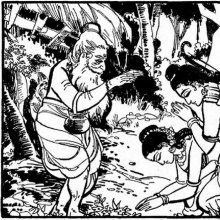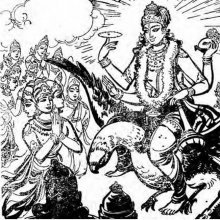Mahavishnu, Mahāviṣṇu: 7 definitions
Introduction:
Mahavishnu means something in Hinduism, Sanskrit. If you want to know the exact meaning, history, etymology or English translation of this term then check out the descriptions on this page. Add your comment or reference to a book if you want to contribute to this summary article.
The Sanskrit term Mahāviṣṇu can be transliterated into English as Mahavisnu or Mahavishnu, using the IAST transliteration scheme (?).
Images (photo gallery)
In Hinduism
Vaishnavism (Vaishava dharma)
Source: Pure Bhakti: Bhagavad-gita (4th edition)Mahāviṣṇu (महाविष्णु) refers to “another name of Karaṇodakaśayī Viṣṇu, a plenary portion of Śrī Kṛṣṇa who creates the cosmic manifestion, consisting of countless universes”. (cf. Glossary page from Śrīmad-Bhagavad-Gītā).

Vaishnava (वैष्णव, vaiṣṇava) or vaishnavism (vaiṣṇavism) represents a tradition of Hinduism worshipping Vishnu as the supreme Lord. Similar to the Shaktism and Shaivism traditions, Vaishnavism also developed as an individual movement, famous for its exposition of the dashavatara (‘ten avatars of Vishnu’).
Purana and Itihasa (epic history)
Source: archive.org: Shiva Purana - English TranslationMahāviṣṇu (महाविष्णु) is another name for Viṣṇu, according to the Śivapurāṇa 2.3.23 (“Attempt of Himavat to dissuade Pārvatī”).—Accordingly, as Brahmā said to Viṣṇu: “Save, save, O Viṣṇu [i.e., mahāviṣṇu], save us who have sought refuge in you, being scorched by the great and severe penance of Pārvatī”.

The Purana (पुराण, purāṇas) refers to Sanskrit literature preserving ancient India’s vast cultural history, including historical legends, religious ceremonies, various arts and sciences. The eighteen mahapuranas total over 400,000 shlokas (metrical couplets) and date to at least several centuries BCE.
General definition (in Hinduism)
Source: WikiPedia: HinduismMahavishnu (महाविष्णु) is an aspect of Vishnu, the Absolute which is beyond human comprehension and is beyond all attributes.
Mahavishnu is said to lie in the causal ocean or the Karanodak. He puts the seed of this material universe in Mahāmāyā by glancing at her. Mahāmāyā remains the ever obedient material energy of the Supreme Lord. All the natural elements including sky, fire, water, air and land are created along with mind, intelligence and false ego.
After this, Mahavishnu enters each of the many universes so created (seeds emerging from the pores of His skin) as Garbhodaksayi Vishnu, who lays down in each and every of these individual material universes (Brahmandas). It can be interpreted that Garbodakshayi Vishnu is the collective soul of all souls in a particular material universe and that Mahavishnu is the collective soul of all souls in all of the material universes.
From Garbodakshayi Vishnu then emerges Brahmā who is the secondary creator (due to his need to meditate to create planets in the material universe) of the planetary systems within particularly this material universe (Brahmanda).
In Gauḍīya Vaishnavism, a school of Vaiṣṇavism, the Sātvata-tantra describes three different forms, or aspects, of Vishnu as Mahavishnu, Garbhodakśayī-Viṣṇu and Kṣīrodakaśāyī Vishnu. The term Mahavishnu is similar to Brahman and Almighty Absolute Supreme Personality of Godhead. This means that the Absolute truth is realized first as Brahman (impersonal aspect) then as Paramatma (personal aspect) and finally as Bhagavan (incarnate perfection). So bhakti (loving devotion) goes to Bhagavan, Krishna (the Avatar of Vishnu, Narayana). In this way, bhakti surpasses even yoga, which is aimed at the Supersoul, Paramatma. Mahavishnu is the Supersoul of all living beings (jivaatmas) in all material universes. It is also often used interchangeably with Vishnu to indicate reverence, as the prefix "Mahā" exalts the noun to which it is attached.
Languages of India and abroad
Sanskrit dictionary
Source: Cologne Digital Sanskrit Dictionaries: Monier-Williams Sanskrit-English Dictionary1) Mahāviṣṇu (महाविष्णु):—[=mahā-viṣṇu] [from mahā > mah] m. the great Viṣṇu, [Rāmatāpanīya-upaniṣad; Catalogue(s)] ([especially] Name of Viṣṇu when worshipped by Buddhists, [Monier-Williams’ Buddhism 215])
2) [v.s. ...] Name of Kapila, [cf. Lexicographers, esp. such as amarasiṃha, halāyudha, hemacandra, etc.]
[Sanskrit to German]
Sanskrit, also spelled संस्कृतम् (saṃskṛtam), is an ancient language of India commonly seen as the grandmother of the Indo-European language family (even English!). Closely allied with Prakrit and Pali, Sanskrit is more exhaustive in both grammar and terms and has the most extensive collection of literature in the world, greatly surpassing its sister-languages Greek and Latin.
Kannada-English dictionary
Source: Alar: Kannada-English corpusMahāviṣṇu (ಮಹಾವಿಷ್ಣು):—[noun] Viṣṇu, one of the Trinities.
Kannada is a Dravidian language (as opposed to the Indo-European language family) mainly spoken in the southwestern region of India.
See also (Relevant definitions)
Partial matches: Vishnu, Maha.
Starts with: Mahavishnupritistotra, Mahavishnupujapaddhati, Mahavishnustotra, Mahavishnustutitika.
Full-text (+139): Mahavishnupujapaddhati, Mahavishnustutitika, Adhokshaja, Vikhanasa, Trikakubdhama, Kritamala, Sundarivalli, Mahavishnormahastuti, Sheshanaga, Balarama, Upendra, Mathana, Makavishnu, Sambhala, Mohini, Nandaka, Taladhvaja, Varaha, Mahatattva, Citrarupa.
Relevant text
Search found 51 books and stories containing Mahavishnu, Mahāviṣṇu, Mahavisnu, Maha-vishnu, Mahā-viṣṇu, Maha-visnu; (plurals include: Mahavishnus, Mahāviṣṇus, Mahavisnus, vishnus, viṣṇus, visnus). You can also click to the full overview containing English textual excerpts. Below are direct links for the most relevant articles:
Garga Samhita (English) (by Danavir Goswami)
Verse 1.11.71 < [Chapter 11 - Description of Śrī Kṛṣṇacandra’s Birth]
Verse 8.13.24 < [Chapter 13 - A Thousand Names of Lord Balarāma]
Verse 2.13.7 < [Chapter 13 - The Story of Śeṣa]
Puranic encyclopaedia (by Vettam Mani)
Shri Gaudiya Kanthahara (by Srila Bhaktisiddhanta Sarasvati)
Tiruvaymoli (Thiruvaimozhi): English translation (by S. Satyamurthi Ayyangar)
Introduction to Section 10.9 < [Section 9 - Ninth Tiruvaymoli (Cul vicumpu ani mukil)]
Pasuram 1.1.8 < [Section 1 - First Tiruvaymoli (Uyarvu ara Uyar Nalam)]
Pasuram 2.2.11 < [Section 2 - Second Tiruvaymoli (Tinnan vitu)]
Middle Chola Temples (by S. R. Balasubrahmanyam)
Temples in Tirumukkudal < [Chapter II - Temples of Rajaraja I’s Time]
1. Images set up by Rajaraja I < [Tanjavur/Thanjavur (Rajarajesvaram temple)]
Rajadhiraja I (a.d. 1018-1054) < [Chapter V - Successors of Rajendra I (a.d. 1018 to 1070)]
Temples in and around Madurantakam (by B. Mekala)
Sri Prasanna Varadarajaswamy Perumal Temple < [Chapter 3 - Temples of Madurantakam Taluk]
Atcheeswarar Temple at Acharapakkam < [Chapter 4 - Prominent Temples in Madurantakam Taluk]
Related products




